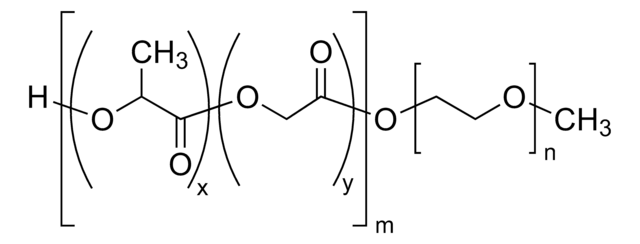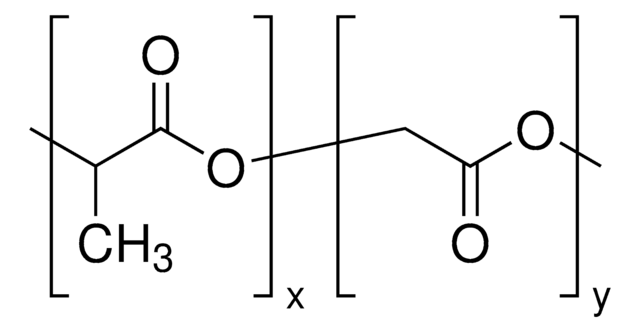Wichtige Dokumente
764760
Poly(ethylene glycol) methyl ether-block-poly(lactide-co-glycolide)
PEG average Mn 2,000, PLGA average Mn 11,500
Synonym(e):
PEG-PLGA, Polyethylene glycol, mPEG-b-PLGA
About This Item
Empfohlene Produkte
Form
pellets
Qualitätsniveau
Zufuhrverhältnis
lactide:glycolide 50:50
Mol-Gew.
PEG average Mn 2,000
PLGA average Mn 11,500
average Mn 13,500 (total)
Zeitrahmen für den Abbau
1-4 weeks
Übergangstemp.
Tm 298-303 °C
Tg 40 °C (PDLLA block)
Tg 6 °C (PEG block)
PDI
≤2.0
Lagertemp.
2-8°C
Suchen Sie nach ähnlichen Produkten? Aufrufen Leitfaden zum Produktvergleich
Allgemeine Beschreibung
Anwendung
Leistungsmerkmale und Vorteile
- Good biocompatibility, low immunogenicity and good degradability.
- Properties can be easily modulated by changing the block copolymer segment sizes to suit a particular application.
Lagerklassenschlüssel
11 - Combustible Solids
WGK
WGK 3
Flammpunkt (°F)
Not applicable
Flammpunkt (°C)
Not applicable
Hier finden Sie alle aktuellen Versionen:
Besitzen Sie dieses Produkt bereits?
In der Dokumentenbibliothek finden Sie die Dokumentation zu den Produkten, die Sie kürzlich erworben haben.
Kunden haben sich ebenfalls angesehen
Artikel
One of the common difficulties with intravenous drug delivery is low solubility of the drug. The requirement for large quantities of saline to dissolve such materials limits their clinical use, and one solution for this problem that has recently generated interest is the formation of drug-loaded micelles.
Local delivery of bioactive molecules using an implantable device can decrease the amount of drug dose required as well as non-target site toxicities compared to oral or systemic drug administration.
Microparticle drug delivery systems have been extensively researched and applied to a wide variety of pharmaceutical and medical applications due to a number of advantages including injectability, local applicability to target tissues and sites, and controlled drug delivery over a given time period.
The development of drugs that target specific locations within the human body remains one of the greatest challenges in biomedicine today.
Unser Team von Wissenschaftlern verfügt über Erfahrung in allen Forschungsbereichen einschließlich Life Science, Materialwissenschaften, chemischer Synthese, Chromatographie, Analytik und vielen mehr..
Setzen Sie sich mit dem technischen Dienst in Verbindung.
